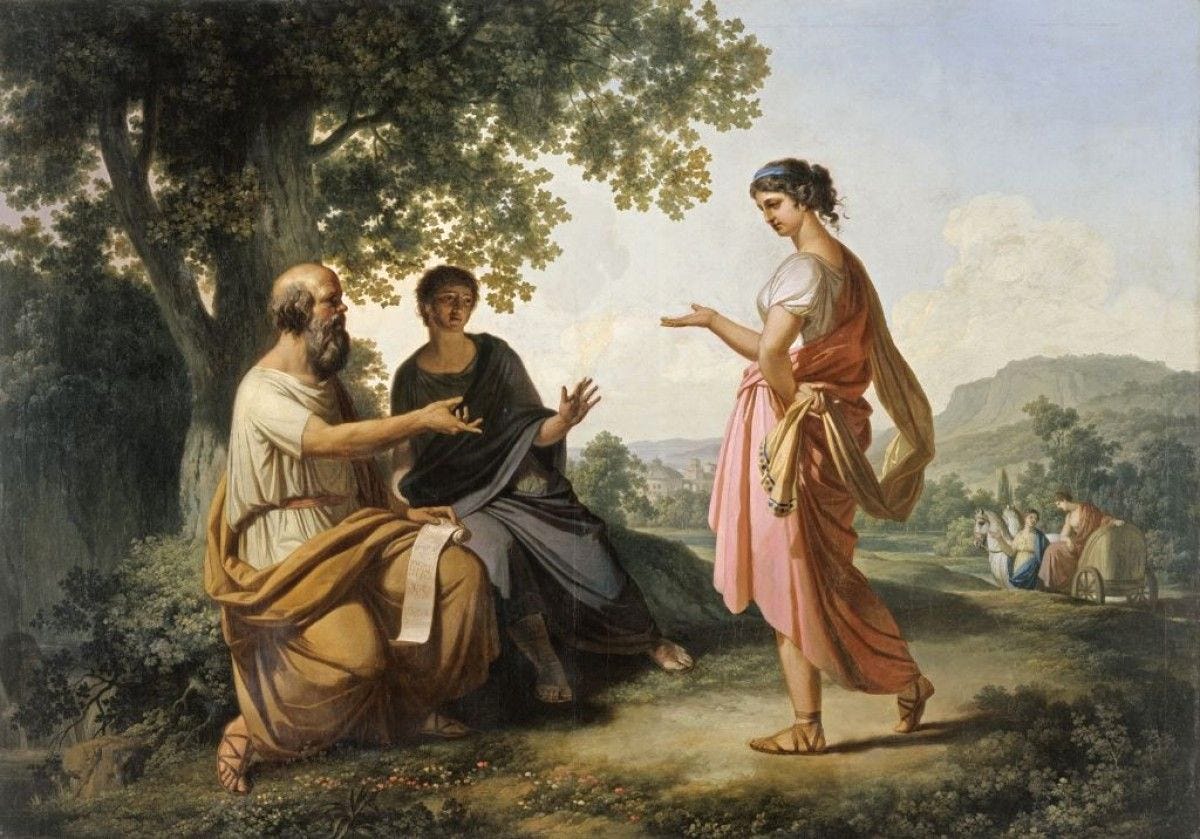Plato’s Ladder to True Love
How eros guides the soul to the True, the Good, and the Beautiful
Plato says we don’t know what real love looks like.
He warned Athens nearly 2,500 years ago, and his words ring even truer today:
The modern world has lost the true meaning of love, and with that, man has lost his life’s purpose.
For Plato, love is far richer than erotic passion, tender affection, or even the close bonds of family and kin. True love is aspirational. It guides man's soul upward, to a transcendental reality so beautiful that it shatters his soul… yet it’s in this self-destruction of love where man discovers his life’s meaning and destiny.
So everything is at stake in your understanding of love. It doesn’t just determine whether or not you build good relationships, but ultimately determines whether or not you fulfill your life’s purpose.
Here then is Plato’s teaching on love and how it leads you to your life’s destiny.
Reminder:
Subscribe to support my mission of restoring Truth, Beauty, Goodness, and God to the heart of the West!
Love’s Many False Faces
Plato’s writing on love takes place in his dialogue The Symposium.
The setting is an informal banquet where Plato’s character Socrates celebrates with prominent men of Athens. Food is plenty, wine flows, and spirits are high, and the party turns their minds to a particular question:
“What is love?”
The specific word for love they use is “eros,” who is the god of sexual love and passion. So a modern way to rephrase the question is:
“What is the purpose of our eros/sexual passions?”
One by one the party members give many theories:
Eros inspires us to virtue and valor
Eros creates harmony in mind, body and soul
Eros is the force behind the creation of the universe
All these theories are intriguing in their own right, but no one can come to an agreement on the best definition. Their arguments lead to further confusion until the party realizes perhaps no one understands the purpose of eros.
Finally Socrates steps forward and makes a bold proclamation:
“You’re all wrong.”
His following speech is perhaps the greatest discourse on eros ever written.
The Ladder of True Love
Socrates begins his speech with a jarring statement:
“Love is NOT inherently good.”
How could this possibly be?
First, let’s remember our definitions here. Love is defined in this dialogue as eros, or romantic passion. Socrates’ statement effectively means sexual passion for a beloved is not by itself a good thing, nor a bad thing. It can be either.
Then what makes eros good or bad?
Socrates explains — eros is but a spirit, perhaps the strongest spirit man will ever encounter. Your sexuality is a tool that can either guide you to the heavens, or send you to ruin.
So then, what is the right way to use our eros? How can our sexuality guide us to heavenly Goodness?
Socrates revealed he was tutored on this very question by a wise woman named Diotima. She told him love is a ladder, and your eros is the spirit that helps you climb the ladder towards the divine.
She stresses that eros is not good itself, but eros desires good things. Specifically, your eros desires beautiful things.
Since some things are more beautiful than others, your eros will naturally be drawn to what is supremely beautiful. Its purpose is to guide you to seek that highest object of desire.
For Plato, this is the reality of the transcendental forms — to love and ascend to the True, Good, and Beautiful:
Your earthly passions are made to love heavenly Truth.
But how do you train your eros to seek heavenly truth? How do you learn to love the True, Good, and Beautiful?
Diotima says love is a ladder to be climbed. Each rung ascends your soul higher to the True, Good, and Beautiful.
She lays out the exact blueprint to climb this ladder, love the transcendentals, and perhaps deign to glimpse the face of God himself.





